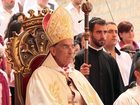Spotlight
A unit from the Syrian army accidentally fired at the Lebanese army when the former infiltrated northern Lebanon on Thursday, reported the National News Agency.
It explained that a 15-member unit from the Syrian army entered Lebanon near the northern town of al-Mwanseh as it was following shepherds along the Lebanese-Syrian border.
 Full Story
Full Story
Former Prime Minister Saad Hariri voiced on Thursday his support for the Lebanese people and their ability to defend Lebanon’s democratic system against all attempts to target it.
He said in a statement on the occasion of International Democracy Day: “We are voicing a concern over democracy today because of the threat of arms, which are democracy’s greatest enemy.”
 Full Story
Full Story
U.S. Ambassador to Lebanon Maura Connelly stressed on Monday the need for Lebanon to commit to all of its international obligations.
She made her statement after holding talks with President Michel Suleiman at the Baabda Palace.
 Full Story
Full Story
Prime Minister Najib Miqati stressed on Thursday that Lebanon is capable of overcoming the difficult phase the region is going through as it did in the past in overcoming several crises that affected its economic and social sectors.
He said during the opening of the Arab Investment Conference for Banking, Industry, Tourism and Real Estate held in Beirut: “We are keen on refraining from meddling in the affairs of any Arab country.”
 Full Story
Full Story
Progressive Socialist Party leader MP Walid Jumblat received a verbal message from Syrian President Bashar Assad informing him that Damascus has decided to freeze relations with the MP for the time being, al-Liwaa newspaper reported.
Last week, Assad criticized Jumblat’s statements in which he advised former Prime Minister Saad Hariri to follow his example and refrain from getting involved in developments in Syria, informed sources told the daily.
 Full Story
Full Story
The joint parliamentary committees discussed on Thursday the draft law on the electricity project that was referred to parliament following a cabinet approval last week.
The draft law includes only two articles. The first allows the government to begin the implementation of the project before receiving the funds from the state budget and the second calls for the implementation of the law upon its publication in the official gazette.
 Full Story
Full Story
The Vatican has made an official request to Bkirki to review the latest controversial statements that Maronite Patriarch Beshara al-Rahi made to take the appropriate stance from them, informed European sources said.
The sources told al-Liwaa daily published Thursday that the Vatican would study and evaluate the statements which al-Rahi claimed were taken out of context.
 Full Story
Full Story
President Michel Suleiman defended on Thursday Maronite Patriarch Beshara al-Rahi’s recent statements, saying that they stem from his role as the representative of Christians in Lebanon and the region.
He said after holding talks with the Patriarch in Diman: “The Patriarch succeeded in voicing to the French state the Christians’ concerns over sectarian tensions and the naturalization of Palestinian refugees in Lebanon.”
 Full Story
Full Story
The March 14-led opposition is seeking to propose a draft law on funding the Special Tribunal for Lebanon probing the assassination of ex-Premier Rafik Hariri to find a solution to the $32 million Lebanon is obligated to pay for the international court, An Nahar newspaper reported on Thursday.
“They (March 14 camp) are discussing the possibility of presenting a draft law to the parliament to fund the STL, like (Free Patriotic Movement leader) MP Michel Aoun did in the issue of the electricity project,” the daily said.
 Full Story
Full Story
Prime Minister Najib Miqati urged Lebanese officials to return to the language of reason and logic and abandon violent and sectarian rhetoric, during Wednesday’s cabinet session.
He noted that “an unhealthy mood is affecting Lebanon’s political society,” criticizing the obvious “cursing language” between factions.
 Full Story
Full Story




